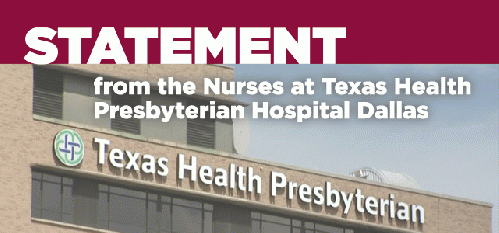Reprinted from National Nurses United
This is an inside story from some registered nurses at Texas Health Presbyterian Hospital in Dallas who have familiarity with what occurred at the hospital following the positive Ebola infection of first the late Thomas Eric Duncan and then a registered nurse who cared for him Nina Pham.
The RNs contacted National Nurses United out of frustration with a lack of training and preparation. They are choosing to remain anonymous out of fear of retaliation.
The RNs who have spoken to us from Texas Health Presbyterian are listening in on this call and this is their report based on their experiences and what other nurses are sharing with them. When we have finished with our statement, we will have time for several questions. The nurses will have the opportunity to respond to your questions via email that they will send to us, that we will read to you.
We are not identifying the nurses for their protection, but they work at Texas Health Presbyterian and have knowledge of what occurred at the hospital.
They feel a duty to speak out about the concerns that they say are shared by many in the hospital who are concerned about the protocols that were followed and what they view were confusion and frequently changing policies and protocols that are of concern to them, and to our organization as well.
When Thomas Eric Duncan first came into the hospital, he arrived with an elevated temperature, but was sent home.
On his return visit to the hospital, he was brought in by ambulance under the suspicion from him and family members that he may have Ebola.
Mr. Duncan was left for several hours, not in isolation, in an area where other patients were present.
No one knew what the protocols were or were able to verify what kind of personal protective equipment should be worn and there was no training.
Subsequently a nurse supervisor arrived and demanded that he be moved to an isolation unit -- yet faced resistance from other hospital authorities.
Lab specimens from Mr. Duncan were sent through the hospital tube system without being specially sealed and hand delivered. The result is that the entire tube system by which all lab specimens are sent was potentially contaminated.
There was no advance preparedness on what to do with the patient, there was no protocol, there was no system. The nurses were asked to call the Infectious Disease Department. The Infectious Disease Department did not have clear policies to provide either.
Initial nurses who interacted with Mr. Duncan nurses wore a non-impermeable gown front and back, three pairs of gloves, with no taping around wrists, surgical masks, with the option of N-95s, and face shields. Some supervisors said that even the N-95 masks were not necessary.
The suits they were given still exposed their necks, the part closest to their face and mouth. They had suits with booties and hoods, three pairs of gloves, no tape.
For their necks, nurses had to use medical tape, that is not impermeable and has permeable seams, to wrap around their necks in order to protect themselves, and had to put on the tape and take it off on their own.
(Note: You can view every article as one long page if you sign up as an Advocate Member, or higher).





